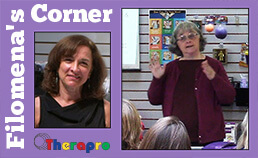
Teresa A. May-Benson, ScD, OTR/L, FAOTA, is a pillar in the field of sensory processing disorder (SPD). She is the Executive Director of the Spiral Foundation (Sensory Processing Institute for Research and Learning), whose stated mission is “To Increase Understanding and Acceptance of Sensory Integration and Sensory Processing Dysfunction through Education and Research.” Dr. May-Benson is an esteemed educator and researcher as well as a clinician at OTA The Koomar Center in Massachusetts. At today’s Saturday seminar entitled: ASHs to A/ASPs: Comparison of Assessment Tools for Adolescents and Adults with Sensory Processing Disorder, she provided a comprehensive review of available assessments for the adolescent and adult populations with accompanying research, as well as a detailed overview of her tool, Adult/Adolescent Sensory History (ASH), published in 2015.
Dr. May-Benson reviewed research studies conducted on adults with SPD and concluded that there is a paucity of research and more is needed. She outlined what we currently know about SPD in adults, including how it impacts all aspects a person’s life. A poignant example she described was a mother who is sensory defensive who had difficulty maintaining a family relationship with her child who is a sensory seeker. The challenge for therapists during the process of assessment is to explore what things are affecting the person’s ability to engage in life activities. Dr. May-Benson also cited the problem of an apartment dweller who is auditory defensive and lives in an apartment in between two apartments. Moving to an apartment end unit that has extra insulation from noise may be a good solution to explore with this client. These examples demonstrate the value of an interview as part of the assessment process because it helps the therapist gather information about the individual’s daily life experience, along with formal screening and direct assessment.
There are a number of tools available to assess SPD that Dr. May-Benson reviewed, discussing their positive aspects and their limitations. She cautioned that screening tools should be used only to determine whether a sensory-based problem is present that warrants further testing.
According to the Spiral Foundation, “The Adult/Adolescent Sensory History is designed as a self-report assessment of sensory and motor behaviors commonly observed in individuals with difficulties processing and integrating sensory information. The purpose of this assessment is to help identify adults and adolescents ages 13 to 95 who experience problems in sensory processing and integration as well as assist therapists in clinical reasoning when creating interventions for these individuals. Based on the conceptual model of sensory processing and sensory integration proposed by A. Jean Ayres, this measure is designed to identify difficulties in five key areas of functioning: Sensory Discrimination, Sensory Modulation, Postural-Ocular Skills, Praxis, and Social-Emotional Functioning.” The ASH has performed strongly on tests of reliability and validity. It is available at the Spiral Foundation www.thespiralfoundation.org This website offers many resources including webinars, courses, and free SPD education toolkits.
In her presentation, Dr. May-Benson provided the following implications for practice:
- Assessment of adults with SPD is complex and should be comprehensive.
- To determine sensory integration difficulties, assessment must include more than questionnaires.
- Be aware that different measures emphasize different aspects of sensory integration; be aware that we may miss vital information if we use one measure over another.
- Select measures with the particular client’s needs.
- Recognize that all measures are not created equal: some measures can provide better functional performance information than others and others may provide better psychometrics than others.
We were honored to present Teresa May-Benson’s seminar to spotlight her diligent work over the past 15 years to develop the ASH, which is a comprehensive, valid and reliable adolescent/adult assessment of SPD. Her research has illuminated the issues that clients with SPD as well as their families and practitioners face. Her research is ongoing and crucial.
Here is a sample of positive reviews about Teresa’s seminar:
“Excellent overview of Sensory Assessment tools.” – Teri B., Occupational Therapist
“I would recommend this seminar to a colleague if they work with an adolescent or adult population. The ASH appears to be a useful tool.” – Anonymous, Occupational Therapist
“Thank you for a well-organized and comprehensive seminar about the tools available for adolescent and adults with SPD. Teresa’s new assessment tool has great potential!” – Maria K., Occupational Therapist
Thank you, Teresa!
Filomena Connor, MS, OTR/L
December 15, 2018
